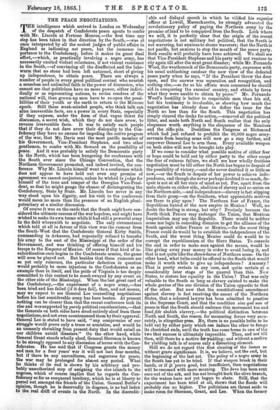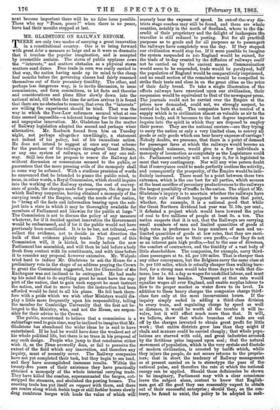THE PEACE NEGOTIATIONS.
11.1 intelligence which arrived is London on Wednesday of the despatch of Confederate peace agents to confer with Mr. Lincoln at Fortress Monroe,—the first time any
step has been taken in that direction by the South,—was at once interpreted by all the coolest judges of public affairs in England as indicating not peace, but the immense im-
portance to the Confederacy, before it makes its great final effort,—which, as practically involving a negro army, has necessarily excited violent reluctance, if not violent resistance in the South,—of convincing all the disaffected and the luke- warm that no stone had been left unturned, short of giving up independence, to obtain peace. There are always a number of people in every great political contest who nourish a senseless and unlimited faith in the power of discussion, who cannot see that politicians have no more power, either indivi- dually or as representing nations, to revise resolves of the national will, than grown-up men have to re-open the possi- bilities of their youth or the earth to return to the Miocene ,epoch. Still these weak-minded people, who think talk can alter irreversible facts, are a power in every State, especially if they express, under the form of that vague thirst for discussion, a secret wish, which they do not dare avow, to reverse irreversible facts. It was to satisfy such people that if they do not dare avow their disloyalty to the Con- federacy they have no excuse for impeding the active progress of the war, that Mr. Davis sent the most pacific member of his Government, Vice-President Stephens, and two other gentlemen, to confer with Mr. Seward on the possibility of peace. And it was probably to satisfy the Democratic party in the North, which has been hungering for conference with the South ever since the Chicago Convention, that the Northern Government promoted, and indeed invited, the con- ference. Why Mr. Lincoln himself went to a conference which does not appear to have held out even any promise of agreement we cannot conjecture, unless he wished to j udge for himself of the tone and temper of the Georgian Vice-Presi- dent, so that he might gauge the chance of disintegrating the Confederacy, State by State. Mr. Lincoln has never in any way stood upon his dignity, and his visit to the conference would mean no more than the presence of an English pleni- potentiary at a similar discussion.
Of course it was on the cards that the South might have con- sidered the ultimate success of the war hopeless, and might have -wished to make its own terms while it had still a powerful army in the field wherewith to negotiate. The only circumstance which told at all in favour of this view was the rumour from the South-West that the Confederate General Kirby Smith, commanding in Arkansas, had repeatedly refused to transfer his army to the east of the Mississippi at the order of the Government, and was thinking of offering himself and his troops to the Emperor of Mexico. Of course if that kind of in- subordination once begins in the Confederate armies, the game will soon be played out. But besides that these rumours are as yet only rumours, the particular defection in question would probably be more injurious to the Confederates as an .example than in itself, and the pride of Virginia is too deeply .committed to this contest to be much swayed by any event on the other side of the Mississippi. When the last great card of the Confederacy,—the experiment of a negro army,—has been tried and has failed (if it does fail), then, and not sooner, may we expect to see General Lee counselling negotiations before his last considerable army has been beaten. At present nothing can be clearer than that the recent conference took its rise and was supported by purely political considerations,—that the Generals on both sides have stood entirely aloof from these negotiations, and not even countenanced them by their approval. General Lee is stated to have said, "any compromise of our struggle would prove only a truce or armistice, and would be an unmanly shrinking from present duty that would entail on -our children untold disasters." On the other hand, while General Grant stands wholly aloof, General Sherman is known to be strongly opposed to any discussion of terms with the Con- federates. He has said that if Congress grants the money and men for a four years' war it will not last four months, but if there be any unreadiness, and eagerness for peace, the war may be prolonged for almost any period. What he thinks of its end is shown by his arbitrary and pro- bably unauthorized step of assignineb the rice islands to the negroes, which of course implies that he regards the Con- federacy so far as conquered territory, which he is at liberty to parcel out amongst the friends of the Union. General Butler's opinion, though he is deservedly in disgrace, is no bad index to the real drift of events is the North. In the discredit-
able and disloyal speech in which he vilified his superior officer at Lowell, Massachusetts, he strongly advocated the revolutionary policy of paying the Northern army by the promise of land to be conquered from the South. Look where we will, it is perfectly clear that the origin of the recent negotiations is not military but political, that the South is not wavering, but anxious to shame waverers; that the North is not pacific, but anxious to stop the mouth of the peace party. Both results will probably have been achieved. We shall see that Vice-President Stephens and his party will not venture to stir again till after the next great disaster; while Mr. Fernando Wood, the weathercock of the Democratic party, expresses with his usual unblushing candour the new view of the defeated peace party when he says, " If the President threw the door open, and the answer was separation and recognition, and nothing else,—so far as his efforts were concerned he should aid in conquering the enemies' country, and obtain by force what they were unable to obtain by peace." Mr. Fernando Wood's hostility is better to respectable men than his aid, but his testimony is invaluable, as showing how much the negotiation has already done to define the issue for the North no less than for the South. This negotiation has simply cleared the decks for action,—removed all the political litter, and made both North and South realize that the only eloquence worth anything is the eloquence of the Monitors and the rifle-pits. Doubtless the Congress at Richmond which had just refused to prohibit the 40,000 negro army- servants from bearing arms will now go a step further, and empower General Lee to arm them. Every available weapon on both sides will now be brought into play.
If we come to consider what possible motive of either fear or hope could be held out by either party to the other except the fear of ruinous failure, we shall see how wholly fruitless negotiation must be till either the North has begun to despair of the possibility of victory,—and she never doubted it so little as now,—or the South to despair of her power to achieve inde- pendence, and though she never perhaps doubted it so much, de- spair is not at all her state of mind as yet. For, apart from the main objects on either side, abolition of slavery and re-union on the Northern side,—and independence—slavery is fast slipping from their grasp—on the Southern, what appreciable motives are there to play upon ? The Northern fear of France, the Republican hatred of the new empire in Mexico ? Well, no doubt the feeling is strong, but why ? Precisely because the North think France may endanger the Union, that Mexican Imperialism may sap the Republic. There would be neither sense nor logic in conceding disunion to get the alliance of the South against either France or Mexico,—for the worst thing France could do would be to establish the independence of the South, and the worst thing Mexico could do would be to corrupt the republicanism of the Slave States. To concede the end in order to make sure against the means, would be like giving away your money in order to avoid losing it, and that is not quite like the shrewdness of Northern sense. On the other hand, what bribe could be offered to the South that would make it worth while to give up independence ? Amnesty ? That is pretty certain in any case, and quite certain at a
considerably later stage of the quarrel than this. New States, to restore her equality in the Union ? That was only valuable to the South so long as slavery existed to make the whole genius of the one division of the Union opposite to that of the other. But now that the constitutional amendment against slavery is fast receiving the assent of the Northern States, that a coloured lawyer has been admitted to practise in the Supreme Court, and that the condition sine qua non of peace is that the South should embrace this movement too and bond fide abolish slavery,—the political distinction between North and South, the reason for measuring forces very accu-
rately, is altogether gone. No, there is no possible bribe to be held out by either party which can induce the other to forego its cherished ends, until the truth has come home to one of the two that success is ultimately impossible. Then, and not till then, will there be a motive for yielding; and without a motive for yielding talk is of course only a disturbing element.
Still we do not regard this first clearing of the issues as without grave significance. It is, we believe, not the end, but the beginning of the last act. The policy of a negro army in the South has yet to be tried. If that weapon break in their hands, or if it prove good, but insufficient, then negotiations will be resumed with more meaning. The dove has been sent
once out of the ark, and has not brought back the olive branch, for the waters have not yet begun to abate. Still, that the experiment has been tried at all, shows that the floods will probably rise no higher. The politicians are thrust aside to make room for Sherman, Grant, and Lee. When the former next become important there will be no false issue possible. Those who say "Peace, peace !" when there is no peace, have had their mouths stopped at last.































 Previous page
Previous page